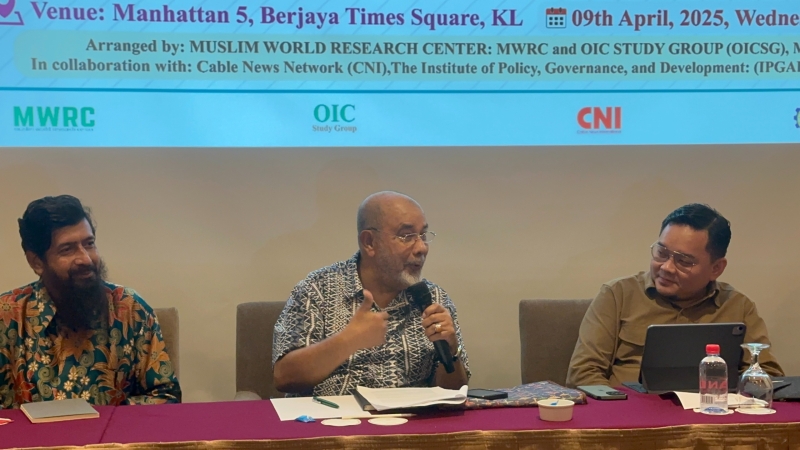- India Sees 9% Drop in Foreign Tourists as Bangladesh Visits Plunge |
- Dhaka Urges Restraint in Pakistan-Afghan War |
- Guterres Urges Action on Safe Migration Pact |
- OpenAI Raises $110B in Amazon-Led Funding |
- Puppet show enchants Children as Boi Mela comes alive on day 2 |
Urgent Resolution of Rohingya Crisis Vital for ASEAN's Broader Interests
--Dr. Syed Hamid Albar, Former Malaysian Foreign Minister

Dr. Syed Hamid Albar, Former Malaysian Foreign Minister speaking at a regional conference on the Rohingya Crisis in Kuala Lumpur on 9 April 2025.
A regional roundtable titled “UN Secretary-General Guterres’ Visit to Bangladesh 2025: A Renewed Global Commitment to Resolving the Rohingya Crisis” was held on 9 April 2025 at a prominent hotel in Kuala Lumpur, Malaysia.
Jointly organised by the Muslim World Research Centre (MWRC) and the OIC Study Group (OICSG), with the support of Cable News International (CNI) and the Institute of Policy, Governance and Development (IPGAD), Bangladesh, the event featured former Malaysian Foreign Minister and Chairman of the OIC Study Group, Dr Syed Hamid Albar, as the chief guest. The session was chaired by Dr Isharaf Hossain, President of MWRC and Secretary-General of OICSG.
In his remarks, Dr Syed Hamid Albar emphasised, “The Rohingya crisis can no longer be viewed as a bilateral issue between Myanmar and Bangladesh—it is now a collective humanitarian and security crisis for the ASEAN region.”
He stressed that the current global governance framework has proven ineffective, and it is time to explore alternative strategies and strengthen regional cooperation for a durable solution.
Given Malaysia's current chairmanship of ASEAN, Dr Albar noted it as a critical opportunity to take meaningful steps forward. He pointed out the cordial relations between Malaysian Prime Minister Dato’ Seri Anwar Ibrahim and Bangladesh’s Chief Adviser Professor Muhammad Yunus as a potential diplomatic advantage towards a sustainable resolution.
Referring to Myanmar’s recent pledge at the BIMSTEC Summit to repatriate 180,000 Rohingya refugees, he cautioned, “Agreements alone are not sufficient—implementation is the key. What we now need is multi-layered diplomacy and the active engagement of all stakeholders.”
Among other speakers, Mr Ashfaq Zaman, Vice Chairman of CNI, remarked, “To resolve the Rohingya crisis effectively, mutual trust, realistic expectations, and implementable strategies are essential. We must send a message of hope to this displaced population.”
Mr Jamal Shamsuddin, President of the Malaysian Islamic NGO Association, stated, “Malaysia has long stood by the Rohingya people—now is the time for ASEAN, under Malaysian leadership, to play a decisive role in resolving this crisis.”
Mr Mohd Fahmi Samsuddin, former adviser to the Malaysian Foreign Minister and President of ABIM, noted, “It is a moral and religious duty of the Muslim world to stand by the stateless and persecuted. ASEAN nations must coordinate effectively to address this crisis.”
Mr Ahad Asad Abbas Khan, a diplomat from the High Commission of Pakistan, called for “a united front by the Muslim world under joint OIC-ASEAN leadership to ensure justice, protection, and voluntary repatriation for the Rohingya refugees.”
Speakers such as Dr Shahabuddin Ahmed of the University of Malaya and Dr Borhan Ahmed, founding President of BNP Malaysia, highlighted the historical contributions of late President Ziaur Rahman and former Prime Minister Begum Khaleda Zia to the Rohingya cause, while elaborating on BNP's present stance.
Rohingya community representative Mohammad Sadek, based in Malaysia, reiterated, “No solution will be sustainable without ensuring citizenship rights, safety, and dignified repatriation for displaced Rohingyas.”
Mr Alauddin Mohammad, Executive Director of IPGAD, stated, “The Rohingya issue is no longer merely a humanitarian or political challenge for Bangladesh—it has become a matter of geopolitical and national security. To harness the strategic potential of the Bay of Bengal, a new Southward foreign policy and firm diplomatic stance are imperative.” He also mentioned the recent emergence of a youth-led political force under the banner of NCP, born out of the July People's Uprising 2024, which is deeply concerned and proactive about the resolution of the crisis.
In his concluding remarks, Dr Isharaf Hossain highlighted the proactive and sincere efforts of Bangladesh’s current interim government in addressing the crisis, which facilitated the recent visit of the UN Secretary-General. He noted that the visit has significantly elevated the geopolitical and strategic prominence of the Rohingya issue at both regional and global levels.
Dr Hossain further emphasised that in the current context, Bangladesh must intensify engagement with Malaysia as ASEAN Chair. Most speakers agreed that a rapid, dignified, and lasting resolution to the crisis requires an inclusive, multi-layered diplomatic strategy involving ASEAN, key international partners, and Muslim-majority nations. In this regard, a joint initiative by Professor Yunus and Mr Anwar Ibrahim, a close ally and current ASEAN Chair, could be instrumental. Such efforts should ideally feature on the agenda of the upcoming ASEAN Summit. Resolving the Rohingya crisis is imperative for the peace, security, and collective interests of both the ASEAN and SAARC regions. - Press release

